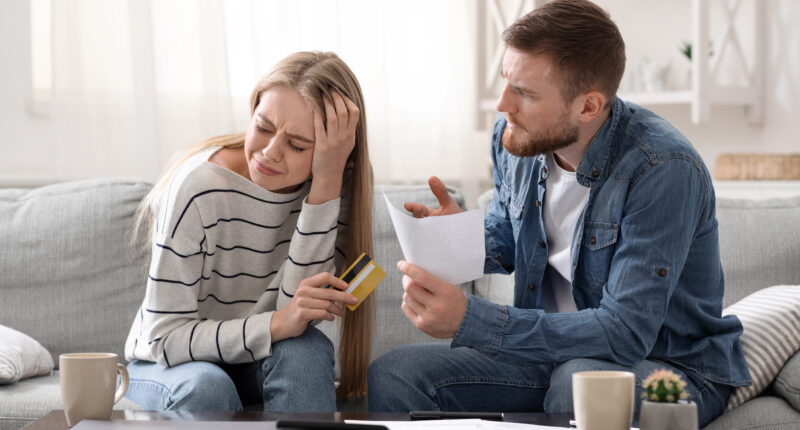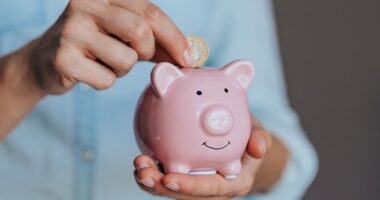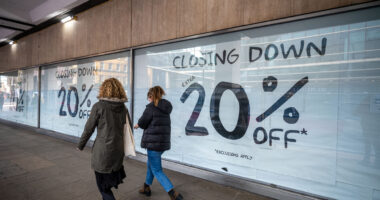DO you want to take back control of your money and become debt-free in 2023?
We have some tried and tested methods to get you on track.
With households overspending by an average £740 during the festive period, according to Bank of England figures, January is the best time to get on top of your cash.
Here, Lucy Alderson explains how to start off and then how four of the most popular debt-clearing techniques work, so you can pick the best one for you.
GET TO GRIPS WITH YOUR MONEY
THE first step to take before anything else is to make a budget.
Write down your monthly income and outgoings, including your minimum debt repayments.


Focus on paying off any debts linked to priority bills, such as your mortgage, rent or council tax.
“The consequences of not paying them can be more serious than with other debts,” says StepChange debt expert Jonathan Chesterman.
If you’re struggling to cover your debts, contact your creditors, who are the people you owe money to.
They may agree to lower your monthly repayments.
Most read in Money
If you can, look into boosting your income so more money can be put towards clearing your debts quicker.
Selling your unwanted items, filling out surveys online and even renting out your driveway when you’re not using it can earn you hundreds.
AVALANCHE METHOD
IN theory, this method will see you shell out the least amount of money for your debts.
Focus on paying off the debt with the highest rate payment first.
Once you’ve paid that off, focus on the next most expensive borrowing, and so on until it’s all paid off.
The avalanche method is best for your finances, says Sarah Coles, Hargreaves Lansdown senior personal finance analyst.
She adds: “This way, you never waste a penny in needless interest, and instead you can focus it all on getting yourself out of debt.”
SNOWBALL METHOD
YOU’LL essentially be doing the reverse to the avalanche method if you pick this technique.
Start paying off your smallest debts first, and work your way up to clearing the largest ones last.
This could be a good method to keep yourself motivated because you’ll see your debts ticked off one by one quicker.
However, you’ll ultimately be paying back more than you need to, Sarah says.
She explains: “It means wasting money on interest, because your smallest debts may not be attracting as high a rate of interest as your larger ones — so you’re prioritising cheap debts over expensive ones.”
50/30/20 RULE
COMING over from the States, this rule has gained popularity in recent years in the UK.
It sees you put 50 per cent of your monthly income towards covering your “needs”, which is basically your food, bills and living costs.
The next 30 per cent goes towards your “wants”, such as hobbies and shopping.
And the remaining 20 per cent is for your debts.
But it might not be the most realistic method to use during a cost-of-living crisis, according to Money.co.uk personal finance expert James Andrews.
He says: “Fitting all your essential spending into 50 per cent of your earnings is a stretch for many at the best of times.
“Add in soaring energy bills, mortgages, rents, council tax and even food prices on top, and anyone trying to live by the rule could find themselves simply unable to pull it off.”
CASH STUFFING
YOU may have seen this method crop up on social media — #cashstuffing clips have 747million views on TikTok alone.
The theory is that each month you leave enough cash in your account to pay off the direct debits you have for existing bills and minimum debt repayments.
Then withdraw money from your account and allocate to different envelopes.
Each envelope is earmarked for a certain thing, such as your groceries, petrol and clothes.
You should then get an envelope for your outstanding debts.
And any money left over can be put into this debt envelope at the end of each month.
‘Cash stuffing helped me wipe £8,000 debt’
SAMANTHA THOMAS went from “living hand to mouth” with around £8,000 worth of debt to clearing nearly all of it using the cash-stuffing method.
The mum of two, who is a teacher and small business owner, paid most of it off in 18 months, and is on track to be debt-free by the end of January.
Each month, after paying bills such as her energy and council tax via direct debit, Samantha, 41, from Wigan, was left with £700 to £800.
She withdrew this money and stuffed it into various envelopes.
These included ones for her debts, groceries, eating out, petrol and money to spend on daughter Elizabeth, 14, and son Thomas, two.
She allocated £120 to £240 a month to her debt envelope.
On top of her salary, she made an extra £400 to £500 a month from various side hustles, including filling out online surveys and testing products from companies.
“It’s a massive relief being nearly debt-free,” she said.
THOUSANDS MISSING OUT ON FREE SCHOOL MEALS
HUNDREDS of thousands of children from hard-up families could be missing out on free school meals.
An estimated 235,000 pupils in England are not registered for the lunches because families do not realise their children qualify or are not sure how to claim, according to the Liberal Democrats.
This is on top of more than 800,000 children who are living in poverty but still do not qualify, according to the Child Poverty Action Group.
That is because families who receive Universal Credit can only earn £7,400 (excluding benefits) before free meals are taken away.
Those on child tax credits must earn less than £16,190 a year.
Lib Dem education spokeswoman Munira Wilson said: “Government ministers are standing idly by while children go hungry, expecting them to learn on empty stomachs. They have chosen not to step in and help.
“Parents should not have to jump through additional hoops to ensure their children are well fed when the Government already knows which families are entitled to free school meals.”
WHO CAN GET FREE MEALS?
Some families can get free school meals without facing an income cap, including those on income support, income-based Jobseeker’s Allowance, income-related Employment and Support Allowance, asylum and certain other benefits.
Plus, all children in England get free school meals in Reception, Years One and Two regardless of family income.
In Wales, free meals are provided in Reception and they are being rolled out to Year One and Two this year, with all primary pupils to be included by the end of 2024.
In Scotland, all children up to Year Five get free meals, but a pledge to extend this to Years Six and Seven has been delayed to 2024.
The Department for Education has revealed that more than one in ten pupils in England who should qualify for free dinners are not registered to receive them.
HOW TO CHECK AND CLAIM
Use the benefits calculator tool on Turn2us.org.uk or Entitledto.co.uk.
You will need to apply through your local council.
Visit www.gov.uk/apply-free-school-meals and enter your postcode to find your council’s online forms.
If your child qualifies, you can also get help through the Holiday Activity and Food Programme – but you need to apply before each school break.


A Department for Education spokesman said: “We are supporting more children than ever before.”
It said more than a third of pupils in England receive free school meals and the National School Breakfast programme has been extended for a year, to July 2024.












